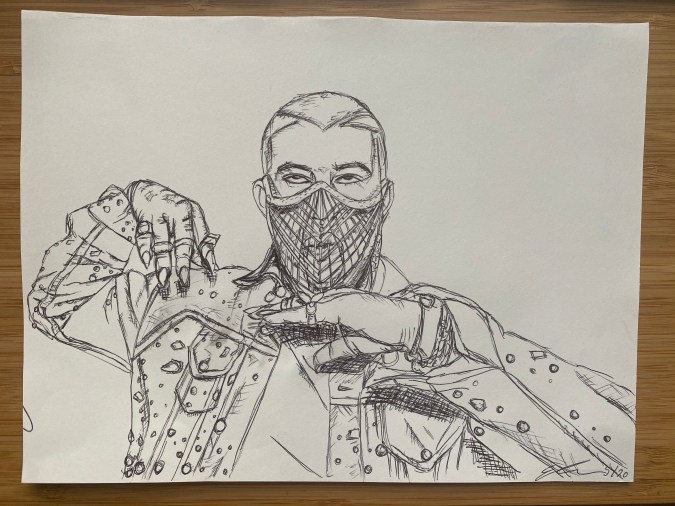You Can Now Take a Bad Bunny Online Course Benefitting Undocumented Workers & Food Banks

Photo courtesy of the artist
Are you interested in studying La Nueva Religión? Do you want to better understand the ethics of doing lo que te da la gana? Have you questions about the significance of the solo perreo? Two genius Benito fans have just the resource for you: Bad Bunny 101, a virtual Benito crash course. Even better: It doubles as a fundraiser for orgs benefitting Latinx folks.
Enrolling is truly next-level stanning, but also, of course there should be discussion of Bad Bunny in an academic context. As stated in the course syllabus, these classes provide an opportunity to “think critically” about the weekly themes.
The instructors behind Bad Bunny 101 are not, they admit, experts themselves, but both devoted fans. Erika Vera and Sarah Cox, a lawyer and a paralegal doing immigration work at a youth services center, respectively, originally did not plan to create a full-fledged online course. The 29-year-old friends were simply trying to convince a coworker to love Bad Bunny as much as they do.
“[She] was very stubbornly not getting into Bad Bunny, despite our casual proselytizing,” Cox says. They began compiling convincing content, then “it kind of snowballed.”

Class meets Thursday nights on Zoom, and while no student is turned away for lack of funds, those who can, are asked to pay $5 to $10 via the honor system to reputable charities: NY State Youth Leadership Council Fund for Undocumented Youth, the Movimiento Cosecha Underground Worker Fund, and the Banco de Alimentos (food bank) de Puerto Rico.
Students range from superfans to novice listeners to folks who beforehand didn’t know much about reggaetón or urbano. Like with any educational course, to get the most out of Bad Bunny 101, doing the homework (reading articles, watching videos) in advance is paramount, as is actively engaging in class discussions (or “juicy conversations,” as Cox calls them) whenever possible. Following Benito on socials is a prerequisite, obviously.
Though classes have already begun, there’s much to learn from the syllabus itself (available here). Week one covered Bad Bunny’s sad-boy tendencies, contextualizing them within toxic masculinity and comparing them to other styles (hip-hop, emo, rancheras). The following week, Lit Boy took students through the history of reggaetón, from its beginnings through now—so, naturally, there’s a discussion about how Benito, as a white-passing Latinx, contributes or benefits from the genre’s black roots.
Currently the class is working through Benito’s political activism; Thursday is the last of three courses in the topic. Queer Visibility and Playing with Gender was the first, then Women’s Issues, and now Puerto Rican Liberation.

Vera and Cox have also incorporated games into their lesson plans.
“We tried bingo recently, which was really fun,” Vera says. “We made bingo cards to go along with a music video viewing. It had things both on the funny, loving side of experiencing Bad Bunny, but also on the critical side—like white-passing women, women as a prop.” Another activity, this one identifying samples in his songs, came with prizes.
Class is already in session—it started on April 23. But there are still two more meetings (May 21 and May 28), and the syllabus in its entirety, including sub-topics, discussion jump-offs and referenced articles, is available online. “I make a drawing of Bad Bunny for them,” Vera says. “[The winner tells] me what their favorite outfit is, and I draw it and mail it to them.”
Signup is still open, and new people join every week, Cox notes. There are four classes left as of today. There’s a chance they might offer a summer course, too. It could look a bit different than this inaugural spring edition, however—depending on discussions, student input and of course, whatever Bad Bunny is doing.
“He’s coming out with content constantly,” says Cox. “So we don’t want to tie ourselves to specific criteria. Who knows when he’s dropping his next album?”
Even if someone takes only one class, even if that person is not already a fan, there’s plenty value to Bad Bunny 101. Thinking critically about the artists we love is crucial to understanding how they affect us personally and how they impact culture at large.
The practice of analyzing in this way reminds us that no artist (or celebrity, for that matter) is beyond reproach, even if a lot of what they’re doing garners praise. It’s possible to question an artist’s motives, ethics, values and so forth—and still have fun listening to them.
Also: The final exam is a virtual perreo party. As noted on the syllabus, “It’s pass/fail.”